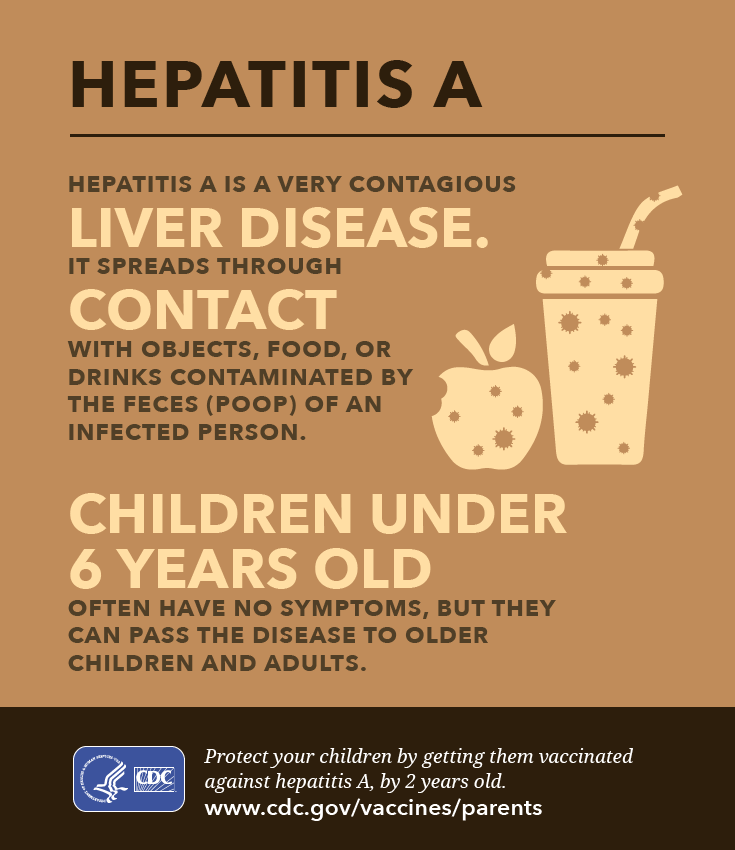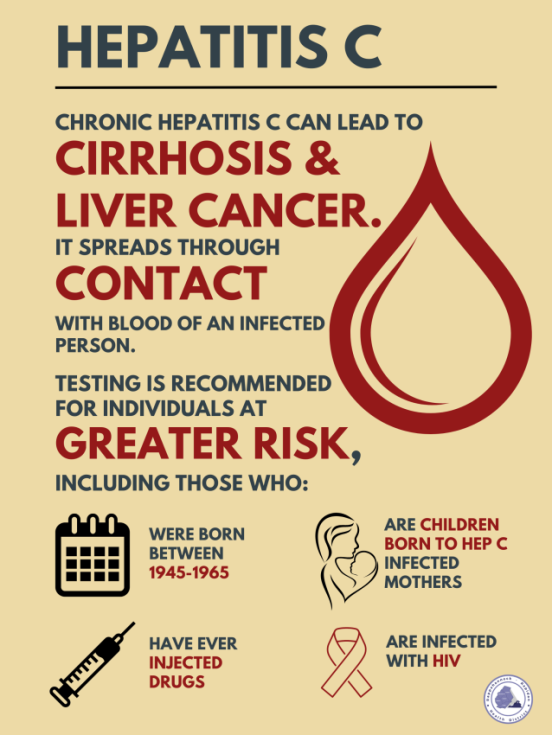
Hepatitis A
Hepatitis A is a contagious liver disease caused by the hepatitis A virus (HAV). The virus is spread when an individual ingests food or drink contaminated with the feces of an infected individual.
Anyone who has not been vaccinated or previously exposed. Certain groups are at higher risk, such as those who:
- Travel or live in countries where hepatitis A is common
- Men who have sexual contact with other men (MSM)
- Those with clotting-factor disorders
- Living with household members that are infected with hepatitis A
- Oral-anal sexual contact with someone who has hepatitis A
Hepatitis A is found in the feces of infected individuals and their feces can contaminate surfaces, objects, food, or drinks. People are infected by ingesting contaminated food or drinks or touching their mouths after touching a contaminated surface. The virus can also be transmitted by sexual activities and contaminated needles.
The incubation or the time between exposure and the appearance of the first symptom appears is usually 4 weeks after exposure, with a range of 15-50 days.
Some people will be asymptomatic, but if symptoms develop, they can include fever, diarrhea, nausea, loss of appetite, abdominal discomfort, dark-colored urine, and jaundice (yellowing of the skin and eyes).
Doctors recommend rest, good nutrition, fluids, and treatment of symptoms. There is no specific treatment and recovery can take weeks to months.
A vaccine is recommended for all children and other at-risk groups including those traveling to certain countries and those at increased risk of infection.
Individuals especially food handlers should practice proper hygiene by frequently washing their hands when preparing after going to the bathroom and others before ingesting their meals.
People with the virus should not handle foods during their contagious period, which is two weeks prior to symptoms and one week after their first week of jaundice.
To learn more click here
Yes, people with symptoms should not attend school or work, especially children who attend daycare and those that work in locations of increased risk including restaurants, daycare, and healthcare workers.


Hepatitis C
Hepatitis C virus (HCV) can be either acute (short-term) or chronic (long-term). Hepatitis C is the most common reason for liver transplants in the United States with the development of cirrhosis and liver cancer.
These people are at greater risk for contracting hepatitis C:
- Persons who inject drugs (PWID)
- Those born between 1945-1965
- People who received a blood transfusion or organ transplant prior to 1992
- Dialysis patients
- Healthcare professionals with occupational exposure to bloodborne pathogens
- People with HIV infection
- Children born to mothers with hepatitis C
- Incarcerated individuals
- People who use intranasal drugs
- People get pierced or tattooed with non-sterile instruments
This type of hepatitis is bloodborne and commonly transmitted through:
- reuse or inadequate sterilization of medical equipment
- transfusion of unscreened blood or blood products
- injecting drug use through the sharing of injection equipment
HCV can be passed from an infected mother to her baby and sexual practices with blood exposure; however, this is less common.
Hepatitis C is not spread through breast milk, food, water, or casual contact (hugging, kissing and sharing food or drinks with an infected person).
The incubation period or the time between exposure and the appearance of the first symptom appears ranges for acute and chronic hepatitis C. Acute hepatitis C symptoms typically appear 6-7 weeks after exposure but can range from 2-12 weeks. Whereas, chronic hepatitis C can take decades to appear.
Most people with hepatitis C do not experience symptoms or have mild symptoms. If symptoms do occur, they include fever, fatigue, loss of appetite, abdominal pain including nausea and vomiting, dark urine, pale feces, joint pain, and jaundice (yellowing of skin and whites of eyes). Chronic hepatitis C can result in long-term health problems, including liver damage, failure, cancer, or even death.
For acute hepatitis C, the recommendation is simply to rest and drink plenty of fluids. Those with chronic hepatitis C are to be monitored regularly for liver disease and evaluated for treatment.
There is no effective vaccine against hepatitis C.
These steps prevent exposure to HCV:
- Avoid contact with blood (wear gloves and clean spills with bleach)
- Do not share needles or other equipment for injecting drugs
- Do not share razors, toothbrushes, nail clippers, or glucose monitors that might have come in contact with another person's blood
- Do not get a tattoo or piercing from an unlicensed facility or informal setting
- Do not have unprotected sex
- If infected, do not donate blood

